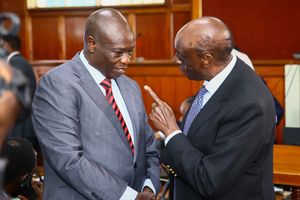CNN's Laura Coates’ chilling courtroom account of bias in sexual assault lawsuits

Laura Coates.
What you need to know:
- In her memoir, Just Pursuit: A Black Prosecutor’s Fight for Fairness, Laura takes the reader through an awakening moment in her career.
- The judge's last line landed with a thud on Laura's heart, 'No one who has been raped, even a young teenager, would wear such ill-fitting clothes.'
Before she became a CNN legal analyst and host of Laura Coates Live, Laura was a graduate of the Princeton School of Public and International Affairs. She had initially passed her bar exam after her graduation at the University of Minnesota Law School.
Her eloquence and conviction elevated her to handling litigation cases in a reputable law firm known as Kasowitz, Benson, Torres and Friedman in New York City. With a solution-based approach to every task, she rose from private practice to federal prosecutor in the administrations of George W. Bush and Barack Obama.
In her memoir, Just Pursuit: A Black Prosecutor’s Fight for Fairness, she takes the reader through an awakening moment in her career. She once sat with the audience in the third trimester of her second pregnancy, as she waited for a different case to start.
A visibly fragmented teenage girl walked to the witness stand as she tugged on her short skirt on one side as the court marshal frowned, admonishing her with his disapproving glance. Laura sensed she was the victim by the way the male defendant shifted uncomfortably in his seat when he saw her.

The cover of Laura Coates' book, Just Pursuit: A Black Prosecutor's Fight for Fairness.
Prosecutors had chosen to make the sexual offences misdemeanours to avoid a jury trial. This was because the victim had not reported the assaults immediately, given the fear and trauma the perpetrator had instilled in her. The prosecution assumed a jury would be less likely to believe the victim, because of the delayed report and the absence of evidence.
The prosecutor hoped the judge was better equipped to understand the decision the terrified victim had made not to report the crime immediately and that the judge would preside over the case without the baggage of preconceived notions about how a victim should behave.
Laura shifted her gaze towards the judge, who scanned the victim, furrowing her brow and turning the corners of her mouth down. She exchanged a glance with the marshal as he delivered the oath, mirroring the admonishment his eyes relayed.
She cocked her head to the side as she dismissively evaluated the victim up and down, pausing occasionally at each section of her body, just long enough to convey her disgust. Laura couldn’t reconcile the judge’s expression with objectivity. She recognised it instantly as premature judgment, the kind one would expect from a first-time juror with a preconceived notion of what kind of person was entitled to be considered a victim.
By instituting a trial bench to avoid the jury, the prosecution had achieved the opposite of its intentions. These preconceived notions of concluding someone's meritocracy by the way they dress, speak, process or grieve are what the prosecution had hoped to prevent.
Unfortunately, without the knowledge of a single fact of the case, or the strength of the evidence against the defendant, Laura concluded within seconds that her prosecutor colleague had lost the case.
Sobbing between sentences, the victim described her ordeal at the hands of the man she called her father—not her biological father, but he had been with her mother for years and practically raised her since she was a toddler. A few years earlier, they had moved in together, and the victim had her own bedroom for the first time.
Her mother had not been working lately, as she had health problems that made it difficult for her to stand for long periods. Her mother’s boyfriend had been paying all their expenses and had a habit of reminding them of it whenever her mother complained about anything. Her mother longed for marriage, and he cruelly dangled the prospect as leverage, while mocking her consistently.
The assaults began when the victim was still prepubescent, intentionally to avoid pregnancy. Forced oral sex and penetration were accompanied by emotional abuse. He called her ugly and undesirable. This was followed by manipulation that often pitted her against her mother, who was aware of the defilement.
The girl described how this abuse had destroyed her relationship with her mother, who would vacillate between calling her a liar and blaming her for enticing her boyfriend out of spite. The mother was eager to believe that her daughter was merely misinterpreting benign attention and misconstruing it as sexual.
Laura eyed across the courtroom at the victim’s mother, whose face was devoid of empathy as she sat behind her paedophile boyfriend, with every ounce of her body language portraying her unwavering support for him. Laura found the testimony impossible to stomach. She silently questioned how this girl would fare in her adult relationships, with the memory of her debilitating emotional post-traumatic disorder.
Throughout the testimony, the judge was unmoved by the girl’s cries, as she stoically clicked on the mouse by the computer monitor she faced and typed on her keyboard. She occasionally paused to see the victim's appearance, shaking her head in derision. Her face froze in cold-hearted indignation that maintained a dismissive expression of a person waiting for a tantrum to end.
After that case went on recess to allow the prosecution and defence teams to deliberate separately, Laura and another counsel were asked to approach the judge’s bench to discuss an unrelated case she was prosecuting. She adjusted herself to artfully eye the judge’s monitor and she grimaced at what she saw. The monitor displayed a shoe shopping website.
While a child had poured her heart out, relaying the trauma of a serial rape without the benefit of her mother as a protector, the judge was trying to find a cognac knee-high boot that fit an extra-wide calf. Laura felt her hormonal temper heighten. The judge hadn’t even had the decency to minimise the page.
When the case resumed, the judge dismissed it after going into a tirade against the victim. Her last line landed with a thud on Laura's heart, “No one who has been raped, even a young teenager, would wear such ill-fitting clothes.”
The writer is a novelist, Big Brother Africa 2 Kenyan representative and founder of Jeff's Fitness Centre (@jeffbigbrother).





